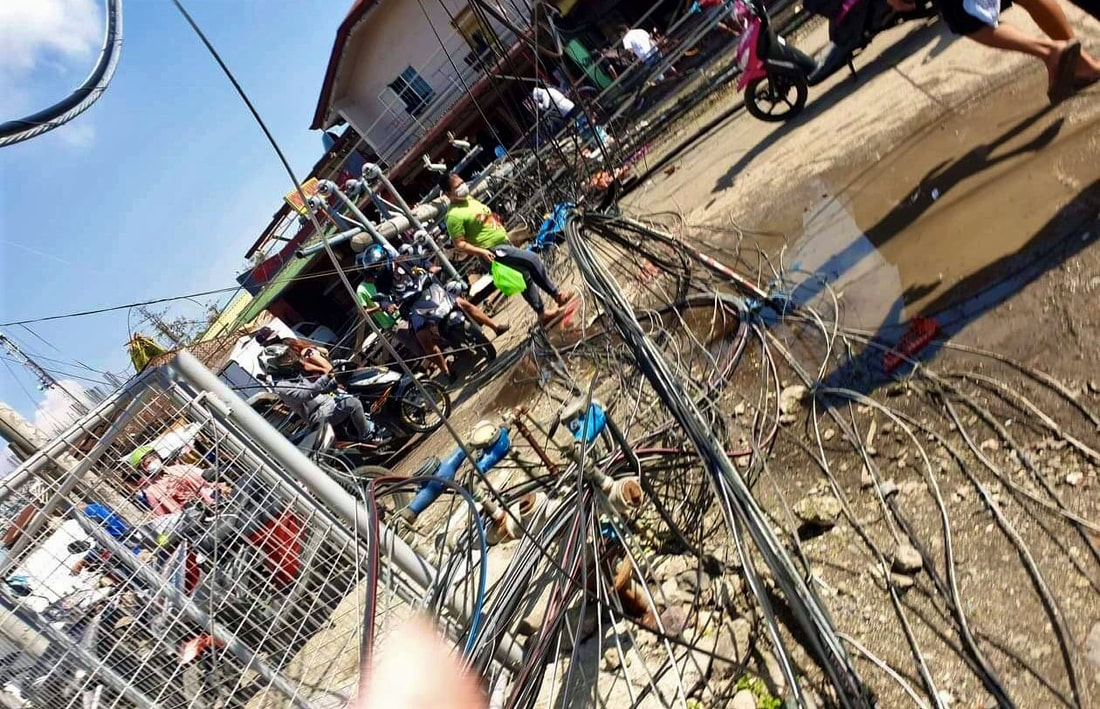|
‘I have always felt that ultimately along the way of life an individual must stand up and be counted and be willing to face the consequences, whatever they are. If we are filled with fear, we cannot do it. And my great prayer is always that God will save me from the paralysis of crippling fear, because I think when a person lives with the fear of the consequences for their personal life, they can never do anything in terms of lifting the whole of humanity.’ (Martin Luther King) I know that fear. I have sometimes experienced it as a vague, background yet seemingly ever-present existential angst. At other times, it has been a response to a specific perceived threat, whether real or imagined, that triggers an anxious feeling. At such times I have learned…and I’m still learning…to pause, breathe, pray and try not to panic. Fight-flight-freeze is an instinctive rather than reflective response that can leave us feeling stressed, powerless and stranded. A real challenge is how to avoid feeding that fear. We may play out all kinds of catastrophic scenarios in the imagination, an endless list of what-if scenarios, amplifying our worst anxieties. We may avoid people, situations or relationships, a kind of flight response, to avoid the risk of our fears actually materialising. Our world may become smaller as we shrink back, self-protect, attempt to keep ourselves safe from harm. (And sometimes that’s a price worth paying.) In his astonishing autobiography, however, Martin Luther King recounts the way he found to face the dangers (which included relentless physical threats, bombing of his home and, ultimately, assassination) – inherent to his calling to address deep-rooted social injustice – and yet still to persevere. It was to face directly his fear of death before God and, by faith, to let go of that fear. That released him to be the remarkable and courageous role model we still admire today.
8 Comments
‘How can we make the snakes feel safe?’ The power of metaphor. Last week I worked with a group of trauma-informed practice experts. We were thinking about leading and influencing change in dynamically-complex relational systems such as teams and organisations. I shared the image of a snakes-and-ladders game board as a way both of depicting the realities of such change experiences and as a way of managing expectations. Whilst playing with possible meanings for the snakes, the ladders and the game as a whole, we explored how, at times, those people or groups we may view as passive, blocking or undermining vis a vis our own plans may be acting out of anxiety. I was reminded of Richard Young’s two key questions in the organisation development (OD) arena: ‘Where's the power and how is it exercised?’ ‘Where's the anxiety and how does it manifest itself?’ In my experience, we may discover anxiety in all dimensions of human systems. Take, for instance, the leader who is feeling pressured by multiple tasks and demands and worried that the well-meaning initiative you are proposing will be the straw that breaks the camel’s back. Or the team member who is worried that the change you are advocating will increase her responsibilities and leave her feeling inadequate, deskilled or exhausted. I worked with a new senior leader who, in our monthly meetings, would ask me lots of very detailed financial questions. I found it time-consuming and stressful because, although I felt confident in managing my budget, I wasn’t used to reporting at such micro levels. Over time, I began to wonder if I might inadvertently have started to represent a snake in his system…and he in mine. At our next meeting, I asked what he would need from me to give him sufficient trust and confidence in my financial management that I wouldn’t need to report like this in subsequent months. He said: ‘If you were to report using financial language.’ I discovered that, as a Finance Director by background and accountable for my area at Executive level, my limited use of financial language had evoked anxiety in him that I may not have a grip on my team’s finances. I spoke with Finance, expanded my lexicon, reported briefly using his language at the next meeting – and we never returned to micro detail again. The principle here was to approach the person and the issue in an open spirit of curiosity, explore respective needs, identify tangible solutions, and apply them to practice. We both transformed from snakes into ladders and our relationship grew from strength to strength. ‘It is always much more difficult to sing when the audience has turned its back.’ (Calvin Miller) Early in my career, I worked for an over-zealous manager who would sit at the front while I was speaking at events; looking impatient, rolling her hands and tapping her watch. Perhaps she was worrying, unnecessarily, whether I would keep to time. I imagine she thought she was being helpful. I learned then that a look of disapproval or distrust is sometimes all it takes to sap a person’s confidence or to ruin their performance. An Australian pop group reflected a similar feeling and impact in its half-pleading song lyric, ‘I can't do well when I think you're going to leave me, even though I try’. (Empire of the Sun) What a stark contrast a word of encouragement can be. Some years later, I was invited to speak at a prestigious international conference. I had grown in confidence, yet there was something about this event that evoked all kinds of anxieties within me. As I sat alone in the VIP lounge beforehand, I could see my hand trembling uncontrollably as I tried hard to hold a hot drink. When I stepped nervously into the auditorium and onto its expansive, spot-lit stage, I could see smartly-dressed delegates being ushered into the room and handed very professional-looking folders as they looked to find a seat. My legs felt like jelly, so I sat down on the steps beside the podium and took deep breaths to try to relax myself. At that moment, a tiny black woman walked directly up to me and smiled brightly. She announced enthusiastically that she has travelled all the way from the Solomon Islands to be here, and was surprised and delighted to read in the brochure that I too was a ‘follower of Jesus’. I thanked her warmly for introducing herself. Her face shone like an angel. ‘I will be sitting in the centre of the room’, she said, ‘and praying for you continually!’ My knees found strength. The speech went well. When have you felt encouraged at work? How did affect your performance? ‘Think of your techniques as toys rather than tools.’ (Brian Watts) This was an insightful, inspiring and innovative coach who had a gift for working at the learning edge, the leading edge, the sometimes bleeding edge. I had the pleasure of working with him as a close colleague and as a client. For me, it was a profound, at times disconcerting, and yet often invigorating learning experience. It challenged my ingrained, default ways of thinking about and doing my work. It also gave me my first experiential taste of the power of Gestalt. His approach started with a simple and open invitation, ‘Be free, creative and experimental. See what happens. Let the child play!’ His conviction was that transformation takes place (a) through experiential learning, and (b) at what is, for the client, his or her own learning edge. It’s that frontier horizon at which we place our self- and culturally-imposed limits. It’s the stretched and stretching place where we may discover our own subconscious psychological defences too. I talked about a forthcoming meeting with an executive team. I was new in my career and found the anticipation of this encounter very anxiety-provoking. The coach invited me to leave the room, then to step back in as if entering the executive meeting room itself. When I did so, he observed (to my surprise) that I was holding my hand across my chest, as if protecting my heart. ‘How would it be if you were to reveal your heart in that meeting?’ I did so, and that transformed everything. In the creative, experimental spirit that lays at the heart of Gestalt coaching, he reminded me, ‘Sometimes these things will fall flat. It’s always a leap of faith.’ It’s a suck-it-and-see approach: try something new and see what may emerge into awareness. It taught me that learning has rational, emotional, intuitive, imaginative and somatic dimensions. I discovered I stand to learn most when I take a risk, when I dare to step out and beyond my natural-instinctive learning mode. Curious to experience the power of Gestalt? Get in touch! [For more examples of Gestalt coaching in practice, see: Just do it; Crab to dolphin; Let's get physical] 'The optimism of the action is better than the pessimism of the thought.' (Greenpeace) Resilience is a common buzz word today, partly in response to the complex mental health challenges that individuals and communities face in a brittle, anxious, non-linear and incomprehensible (BANI) world. Who would have imagined 3 years ago, for instance, that Covid19 would strike or that Russia would invade Ukraine, with all the ramifications this has precipitated in our personal and collective lives? It can feel like too much time spent on the back foot, reacting to pressures that may appear from anywhere, without warning, from left field – rather than creating the positive future we hope for. A psychological, social and political risk is that people and societies develop a ‘Whatever’ attitude, an apathetic ‘What’s the point?’ mentality. After all, what is the point of investing our time, effort and other resources into something that could all get blown away again in a brief moment? A good friend worked in Liberia with a community that was trying to recover from the effects of a bloody civil war. They started to build schools, hospitals and other infrastructure and, just as things were beginning to look hopeful, a violent, armed militia swept through the area and burned everything to the ground. This can feel like an apocalyptic game of snakes and ladders. Take one step forward and, all of a sudden, back to square one again. A close friend in the Philippines befriended people in a very poor makeshift community, surviving at the side of a busy road in boxes and under tarpaulins. She worked hard to improve the quality of their lives, to ensure that they felt and experienced authentic love, care and support, and it started to have a dramatic human impact. Faces brightened and hopes were lifted. Then, out of nowhere, government trucks appeared and bulldozed that whole place to the ground. It could be tempting to give up. One coping mechanism is to focus on living just one moment, one day, at a time because, after all, 'Who can know what tomorrow will bring?' This may engender an element of peaceful acceptance, akin to that through mindfulness. It can also morph into a form of passive, deterministic fatalism: ‘We can’t change anything, so why try?’ Martin Luther King's response stands in stark contrast who, in the face of setbacks, advocated, ‘We’ve got to give ourselves to this struggle until the end. Nothing would more tragic than to stop at this point. We’ve got to see it through.’ Psychologically, both approaches could be regarded as survival strategies, as personal and social defences against anxiety. In a way, they are adaptive responses: ways of thinking, being and behaving that seek to create a greater sense of agency and control in the face of painful powerlessness. In the former case, a level of control is gained, paradoxically, through choosing to relinquish control. It's a letting-go rather than a clinging-on. In the latter, a fight-response (albeit a faith-fuelled, non-violent fight in the case of MLK), control is sought by changing the conditions that deprive of control. Each constitutes it's own way of responding to an external reality – and it’s out there as well as in here that the real and tangible challenges of resilience and transformation persist. The social, political and economic needs of the poorest, most vulnerable and oppressed people in the world don’t exist or disappear, depending simply on how we or they may perceive or feel about them. MLK’s call to action was radical: ‘We need to develop a kind of dangerous unselfishness. It’s no longer a question of what will happen to us if we get involved. It’s what will happen to them (and us) if we don’t?’ [See also: Resilient; When disaster strikes; Clash of realities] It’s not often that I feel so vulnerable. This Saturday night was different. I was walking home from my parents’ home with my daughter when we saw a large group of teenagers ahead. ‘It’s OK’, I said, ‘Just keep walking and we’ll be fine.’ The young men looked around 15 years old and, based on the social-psychological principle that teenagers tend normally only to notice other teenagers – unless deliberately looking out for others – I assumed that we would be, to all intents and purposes, invisible to them. Unfortunately, this turned out to be one of those occasional exceptions to the rule. It started with lone voices hurling abusive comments at us. Then others joined in. Their chants got louder and louder in threatening unison as they now started to follow closely behind us. ‘Don’t look back’, I said, ‘Just keep walking. They’re trying to provoke a response.’ We both tried to continue, to not-show anxiety, yet my heart was pounding and my mind was racing. What if they were to become more aggressive? What if they were to become physically violent? I looked around for potential escape routes; driveways and doorways into which I could usher my daughter hurriedly if things got worse. As we progressed, the group stopped their pursuit and, thankfully, I heard their voices fall further back. We discovered afterwards on social media that ‘a large group of teenage neo-Nazis’ had been reported as harassing people in that area that night, and that the police had been called out. As I reflected on how I had felt, I was aware of an unnerving sense of powerlessness. How to protect my daughter, as a father? How to handle such a large gang, psyched-up in pack mentality? How to respond to these young people, as a follower of Jesus? How to view these antagonists, as trouble or as trouble-d? ‘The willingness to experiment, it turns out, is the chief indicator of how innovative a person or company will be.’ (Hal Gregorson) Test and Learn is an experimental, adaptive technique, used to address complexity, uncertainty and innovation. It’s useful in situations where, say, past experience isn't a reliable guide for future action because e.g. critical conditions have changed. It’s also useful when moving into new, unchartered territory where the evidence needed for sound decision-making can only be generated by, ‘let's suck it and see’. It shares a lot in common with action research: create a tentative hypothesis, step forward, observe the results, try to make sense of them, refine the hypothesis, take the next step. Test and Learn is used in fast-paced, fluid environments, such as by rapid-onset disaster response teams where conventional strategizing and planning isn't realistic or possible. By the time a detailed plan is formulated, things have moved on - and the paper it's written on is sent for recycling before the ink has dried. Test and Learn is also used by marketing teams when testing new products or services or seeking to penetrate new or not-yet-known markets. It provides tangible evidence based on customer responses which, in turn, enables change or refinement before investing further. What psychological, relational and cultural conditions enable Test and Learn to work?
When have you used Test and Learn? How did you do it? What difference did it make? (See also: Unpredictable; Adaptive) A disaster unfolds. Viewed at a distance of 22,300 miles (35,880km) through the lens of a weather satellite in space, the super typhoon that hit the Philippines this week looks quite majestic, its swirling shape displaying a serene, mystical beauty about it. Viewed from ground zero in the eye of the storm, it could not have looked and felt more different. Zoom in now to Jasmin, a poor woman braced with her children, wind and rain battering their fragile home ferociously. Typhoon Rai is one of the strongest storms recorded on Earth this year with wind speeds of 150mph (240kph) as it slammed into the islands. The wind rips off her house roof viciously, as if lashing out with a merciless knife, and the windows shatter, exploding glistening shards of glass everywhere. She runs downstairs with her family to hide under the stairs, praying hard to Jesus, Saviour, in the pitch blackness of night with the deafening, terrifying roar above and around them. As morning breaks and the winds and rain start to subside, the devastation around them emerges from darkness like a war zone. The house looks like an empty shell and everything she had owned has been destroyed. (The poor have no savings – and no insurance). People are walking around, dazed and dismayed by what has just hit them. Power supplies are down and long wooden posts covered in tangled cables lay broken across the roads. Debris is everywhere. People’s homes and possessions are strewn around heartlessly on the streets, as if by some angry, deranged monster. Jasmin looks around for water. Nothing. People are fighting to get onto passing motorbikes to look for help in the city. The petrol price has leapt to £8 (US $10) per litre overnight and the bike fares have soared high with it. Banks are closed, ATMs down and shops broken. No cash. Emergency vehicles with supplies can’t get through, even if they are available and want to. The roads are impassable and impossible. The village is the epicentre of a disaster zone. The floodwater from the storm risks overwhelming the fragile sewage system, contaminating any fresh water that remains and creating a dangerous public health hazard. Fears arise that corrupt officials may covertly divert relief to their own families, friends and political supporters. All infrastructure is wrecked – and desperate people can become dangerous. The poor are left to pray, hope and fend for themselves. Jasmin calls me, briefly, with a weak and faltering phone signal. She urges me to be calm. ‘Jesus is with us’, she says, with a strength of conviction that makes my own faith feel weak and pallid by contrast. Her battery goes flat and the call breaks off. There’s nowhere to charge it and no access to cash to buy a top-up card. She’s still looking earnestly for water, her children are too, and there are long queues of scared and frustrated people everywhere. Her words are ringing loudly with me as I write this and await further news: ‘Jesus is with us.’ Light shines in darkness. Remember the poor. A ‘check engine’ warning light flashed up on my car dashboard this week. It turned out to be a false alarm – a warning that was, apparently, triggered by jump start last week. I know that now. The unnerving part was the not-knowing in-between. What is there was something seriously wrong? How am I to know if a warning symbol can be ignored or if it’s highlighting a genuine cause for concern? In this case, I was able to take the car to a local mechanic to have it checked out. When, however, we experience ‘warning lights’ psychologically or emotionally, it can be harder to discern. A manager is invited to present to an Executive Team and feels deeply anxious. Is that a false alarm or, perhaps, an intuition that is flagging up what ought to be considered a genuine risk? A team member is asked to give critical feedback to a colleague in another department and feels worried about how they may react. Are they being over-sensitive or should they be concerned? Here are some insights to help when making a judgement call. 1. Has the person experienced similar situations and associated emotions in the past? If so, their past may be re-triggering feelings in the present. 2. Does the person have any tangible evidence that supports their concerns? They may be making hypotheses or assumptions. 3. Would different others be likely to feel the same if faced with a similar situation? It may be a personal or cultural narrative the person is telling themself. A tricky part is that it’s not always an either-or phenomenon. The anxious manager may have experienced something similar in the past and the Executive Team may be demanding unrealistic levels of performance. The team member may be highly-sensitive and their colleague may react defensively. How do you distinguish between a false alarm and something that’s real? Do you trust your your feelings or intuition most, or lean more towards evidence or reason – or something else? ‘You ask way too many questions, pal.’ (Homeless person – to me, 1982) I was excited, intrigued and a little nervous to visit my first homeless project in London. As a young Christian activist, I wanted to learn from the lived experience of people in need so that I could use my own life to make a positive and tangible difference in their world. In my enthusiasm and a genuine spirit of curiosity, I asked this homeless man question after question about his life. After a while, he cautioned me politely but sternly – to stop. It was a stark, timely and important lesson. Questions lay at the heart of coaching and facilitation; questions that aim to enable a person or group to think through an issue more deeply or broadly and to reach their own solutions. We may talk about powerful questions, or impactful questions – questions targeted at a person: what he or she is thinking, feeling and doing, rather than at the broader issue itself – to enable the greatest shift. It’s a language that, in a safe space, speaks of constructive challenge with a positive intent. Yet what happens if we are working with people or groups where the very experience of receiving questions, however well intended or framed, evokes considerable anxiety or stress? We can think of various examples: e.g. a refugee who has been subjected to violent interrogation in their country of origin; an asylum-seeker who associates questions with having to defend an appeal for help; a person who has endured abuse from a controlling partner who challenged her/his every action. The language of power-ful questions can itself raise issues of power dynamics implicit in the coach or facilitator relationship with a person or group. After all, the coach is the person posing the questions – not feeling a need, pressure or expectation to answer them – and may at some level reflect or represent the type of person, group or authority the client regards as oppressive. Similarly, impact-ful can sound like hitting, violence, done-to, to a person or group living in a state of anxiety. The homeless man I alluded to above explained, with pain in his eyes, that my questions were taking him to places in his past that he was trying hard not think about or deal with because they felt too traumatic. I was, in effect, inadvertently re-triggering the emotional effects of experiences he had lived through. I remember feeling horrified, apologising, and falling silent in shame. Yet I learned the vital need to pay attention to sensitive relationship and mutual contracting in these fields of work. Given these risks and dynamics, it could feel tempting to shrink back altogether from coaching or, say, action learning with vulnerable people or groups. What if we make a mistake or make things worse? Is there a risk that we will inappropriately stray or be drawn into the realms of counselling or therapy where we are and feel out of our depth? Is there any guidance that could help us navigate such potentially difficult terrain? I will offer some practical insights here that I’ve found helpful: Some vulnerable clients may feel concerned about why they are being asked questions, how they are expected to respond (the ‘right’ or ‘acceptable’ answer, in that context), who will have access to their responses and what they might do with them. This may be especially the case if they have been sent for coaching or action learning, perhaps as a remedial measure, or if they come from a personal-cultural background where posing questions as a developmental approach is unfamiliar. In my experience, vulnerable clients rarely raise these concerns explicitly. They are more likely to surface during contracting as something like, ‘How can I be sure that what I may share here will not be shared elsewhere?’ This points to a need for trust-building. I may ask a client, ‘What would give you the reassurance you need?’, ask other participants (if in a group), ‘What are you willing to commit to?’ and explore and agree explicitly what we will do if, say, a conflict of interest should emerge. Claire Pedrick offers a simple and useful frame that helps ensure healthy and constructive focus and boundaries: ‘What are we here to do?’ and ‘How shall we do this?’ The language of ‘we’ points towards a coactive conversation in which both parties discuss, negotiate and agree their terms of engagement. Claire also regards the client positively, whether an individual or group, as resilient enough to engage in the process – unless it transpires that they aren’t – and contracts accordingly. Geoff Pelham, drawing on Gestalt psychology, focuses on creating an authentic human relationship (‘contact’) with the client rather than a purely transactional one. This can help to create a safe-enough space for coaching to be effective. He may inquire with empathy, ‘What do you need?’ – and listen carefully to the response – before discussing and agreeing how to address respective needs and to move forward. (Attention to need is framed as a healthy foundation for growth, vs ‘needy’.) I may ask a client, ‘Where would you like us to focus our attention?’, ‘What questions is this raising for you?’ or ‘What questions would you find most useful to explore?’ I will also discuss and agree explicitly with the client what he or she may do if I (or others, in a group) pose a question that, for whatever reason, he or she would prefer not to answer; e.g. simply to respond with, ‘Thank you.’ This enables the client to exercise choice and control throughout and, by doing so, to enhance their own agency. Finally, Karen Treisman encourages us to beware of 'pathologising' the client; of focusing on his or her vulnerability as if it’s their sole defining characteristic and, instead, ‘To see the whole person, their story, their world – to magnify, celebrate and learn from people’s survivorships, strengths, resources and what they truly bring to the table.’ I’m keen to learn: what has been your experience of working with vulnerable people or groups? What trauma-informed principles help to guide your practice? (See also: A Safe-Enough Space) (For further research and resources in this area, see: Dr Karen Treisman, A Treasure Box for Creating Trauma-Informed Organizations: A Ready-to-Use Resource for Trauma, Adversity, and Culturally Informed, Infused and Responsive Systems, 2021). |
Nick WrightI'm a psychological coach, trainer and OD consultant. Curious to discover how can I help you? Get in touch! Like what you read? Simply enter your email address below to receive regular blog updates!
|













 RSS Feed
RSS Feed